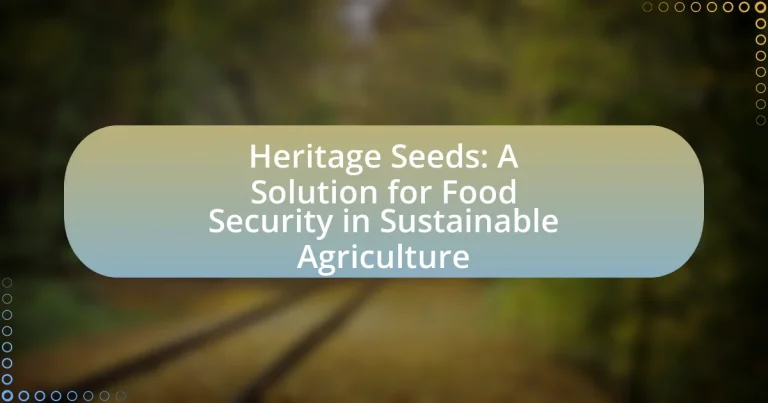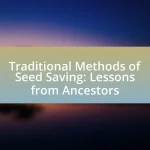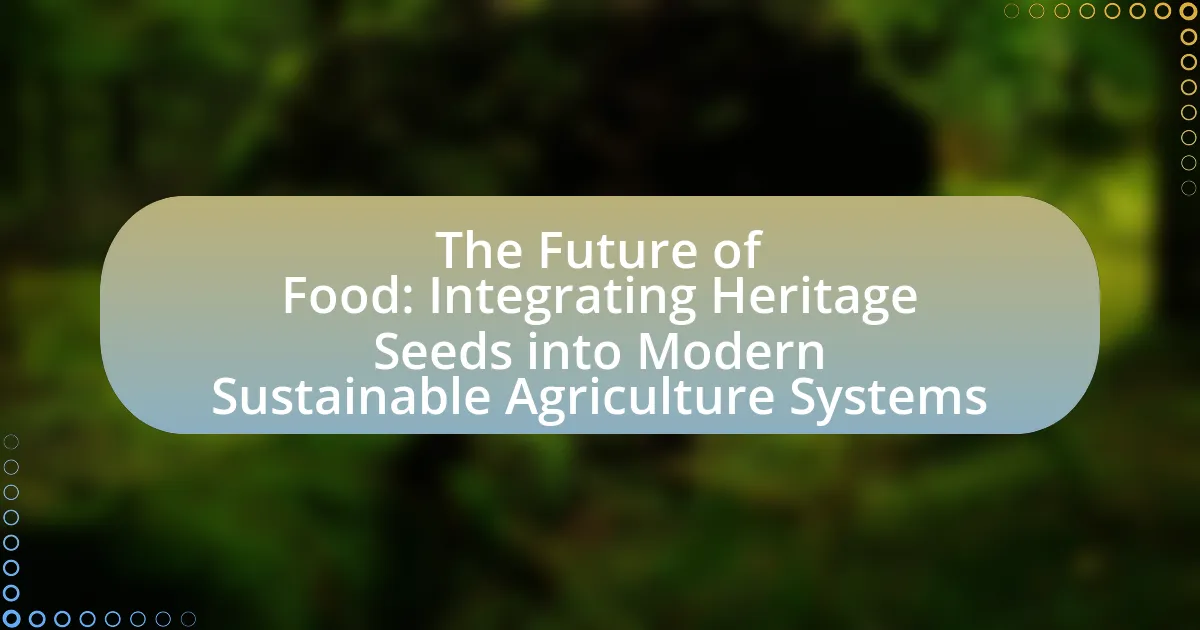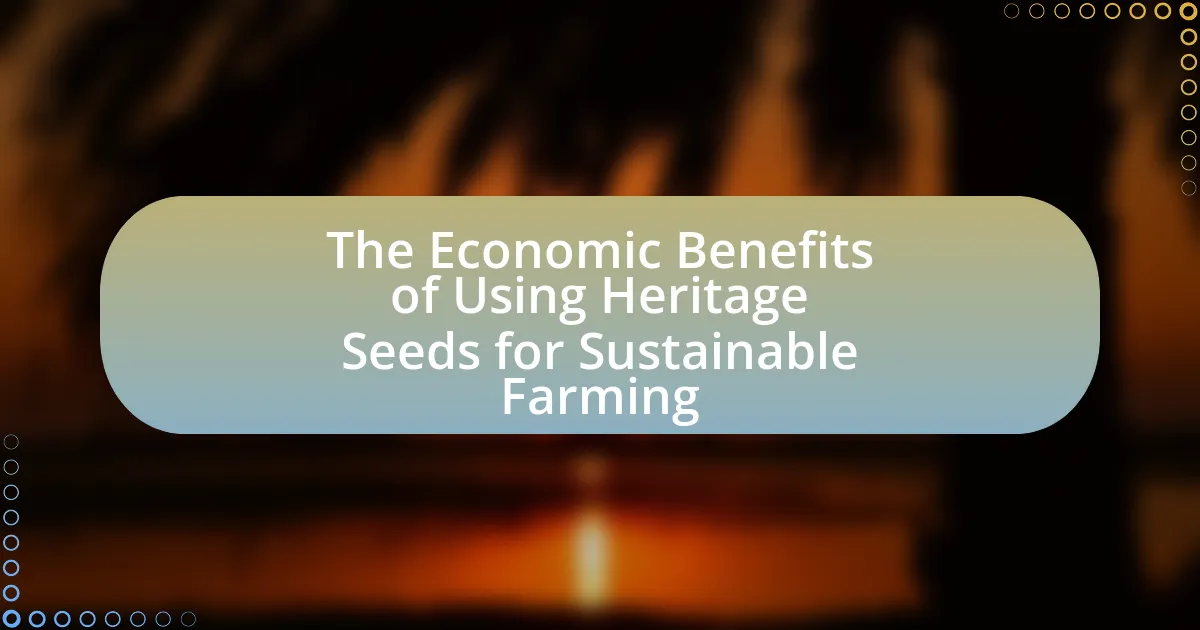Heritage seeds are traditional, open-pollinated varieties that have been cultivated for generations, playing a vital role in enhancing food security and promoting sustainable agriculture. These seeds contribute to biodiversity, allowing crops to adapt to local environments and resist pests and diseases, which is increasingly important in the face of climate change. The article explores the differences between heritage seeds, hybrid seeds, and GMOs, highlighting their resilience, environmental benefits, and significance in sustainable farming practices. It also addresses the challenges farmers face when using heritage seeds and outlines strategies for effective cultivation, while emphasizing the importance of policy changes and consumer advocacy in supporting the use of these seeds for a more secure food future.

What are Heritage Seeds and Why are They Important for Food Security?
Heritage seeds are traditional varieties of seeds that have been passed down through generations, often cultivated for their unique traits and adaptability to local environments. They are important for food security because they contribute to biodiversity, which enhances ecosystem resilience and provides a wider range of crops that can withstand pests, diseases, and climate change. According to the Food and Agriculture Organization (FAO), preserving genetic diversity in crops is crucial for sustainable agriculture and food security, as it allows for the development of new varieties that can adapt to changing conditions.
How do Heritage Seeds differ from Hybrid and GMO Seeds?
Heritage seeds differ from hybrid and GMO seeds primarily in their breeding methods and genetic stability. Heritage seeds are open-pollinated varieties that have been passed down through generations, maintaining their genetic traits over time, while hybrid seeds result from controlled cross-breeding between different plant varieties to produce specific traits, and GMO seeds are genetically modified organisms that have been altered at the DNA level using biotechnology to express desired characteristics. Heritage seeds can be saved and replanted by farmers, preserving biodiversity and traditional agricultural practices, whereas hybrid seeds often do not produce offspring with the same traits, requiring farmers to purchase new seeds each season. GMO seeds are subject to regulatory scrutiny and are designed for specific traits such as pest resistance or herbicide tolerance, which can lead to ecological concerns.
What characteristics define Heritage Seeds?
Heritage seeds are defined by their ability to be open-pollinated, which allows them to reproduce true to type in subsequent generations. These seeds are typically non-hybrid and have been passed down through generations, often retaining unique traits and flavors that are well-suited to local growing conditions. Heritage seeds are also known for their genetic diversity, which contributes to resilience against pests and diseases, and they are often grown using sustainable agricultural practices. This information is supported by the fact that heritage seeds have been cultivated for over 50 years, preserving traditional varieties that are adapted to specific climates and soils.
Why are Heritage Seeds considered more resilient?
Heritage seeds are considered more resilient because they have been cultivated over generations, allowing them to adapt to local environmental conditions and resist pests and diseases. This adaptability results from their genetic diversity, which enhances their ability to thrive in varying climates and soil types. Studies have shown that heritage varieties often outperform modern hybrids in terms of resilience, particularly in organic farming systems, where they can better withstand stressors such as drought and soil degradation. For example, research published in the journal “Agriculture, Ecosystems & Environment” indicates that heritage crops exhibit greater genetic variability, which is crucial for survival in changing agricultural landscapes.
What role do Heritage Seeds play in sustainable agriculture?
Heritage seeds play a crucial role in sustainable agriculture by preserving biodiversity and promoting resilience in food systems. These seeds, often heirloom varieties, are adapted to local climates and conditions, which enhances their ability to thrive without reliance on synthetic fertilizers and pesticides. Research indicates that heritage seeds can yield crops that are more nutritious and flavorful compared to modern hybrids, contributing to food security. Additionally, their genetic diversity helps protect against pests and diseases, reducing the need for chemical interventions. This aligns with sustainable practices that prioritize environmental health and resource conservation.
How do Heritage Seeds contribute to biodiversity?
Heritage seeds contribute to biodiversity by preserving a wide variety of plant genetic resources that are adapted to local environments. These seeds represent traditional agricultural practices and diverse traits, which enhance ecosystem resilience and adaptability. For instance, heritage seeds can include heirloom varieties that have been cultivated for generations, showcasing unique characteristics such as drought resistance or disease tolerance. This genetic diversity is crucial for maintaining healthy ecosystems and supporting food security, as it allows for a broader range of crops that can withstand changing climate conditions and pests. Studies have shown that agricultural biodiversity, including heritage seeds, is essential for sustainable farming practices and can lead to improved yields and reduced reliance on chemical inputs.
What are the environmental benefits of using Heritage Seeds?
Heritage seeds provide significant environmental benefits, including enhanced biodiversity, improved soil health, and reduced reliance on chemical inputs. By preserving a wide variety of plant genetics, heritage seeds contribute to ecosystem resilience, allowing crops to adapt to changing climate conditions and pest pressures. Studies indicate that diverse crop rotations, which often include heritage varieties, can improve soil structure and fertility, leading to better water retention and reduced erosion. Additionally, heritage seeds typically require fewer synthetic fertilizers and pesticides, promoting a healthier environment and reducing chemical runoff into waterways.
Why is food security a pressing issue today?
Food security is a pressing issue today due to the increasing global population, which is projected to reach 9.7 billion by 2050, leading to a higher demand for food. This demand is compounded by climate change, which disrupts agricultural productivity through extreme weather events, affecting crop yields. Additionally, approximately 690 million people are currently undernourished, highlighting the urgent need for sustainable agricultural practices to ensure access to nutritious food. The reliance on a limited number of crop varieties further exacerbates vulnerability, making the preservation and use of heritage seeds crucial for enhancing biodiversity and resilience in food systems.
What factors contribute to food insecurity globally?
Food insecurity globally is primarily influenced by factors such as poverty, climate change, conflict, and economic instability. Poverty limits access to food due to insufficient income, affecting over 700 million people who live on less than $1.90 a day. Climate change disrupts agricultural productivity through extreme weather events, with the Intergovernmental Panel on Climate Change reporting that crop yields could decline by up to 30% by 2050 in some regions. Conflict displaces populations and disrupts food supply chains, as seen in countries like Yemen and Syria, where millions face acute food shortages. Economic instability, including inflation and unemployment, further exacerbates food access issues, as evidenced by the World Bank’s findings that food prices have risen significantly in many developing nations.
How can Heritage Seeds address these challenges?
Heritage seeds can address challenges in food security and sustainable agriculture by promoting biodiversity and resilience in crop production. These seeds, often heirloom varieties, are adapted to local climates and conditions, which enhances their ability to withstand pests, diseases, and climate variability. Research indicates that using heritage seeds can lead to improved yields and better nutritional quality, as they often possess traits lost in modern hybrids. For instance, a study by the University of California found that heirloom tomatoes had higher levels of certain antioxidants compared to commercial varieties, demonstrating their potential health benefits. By cultivating heritage seeds, farmers can also reduce dependency on chemical inputs, fostering a more sustainable agricultural system.
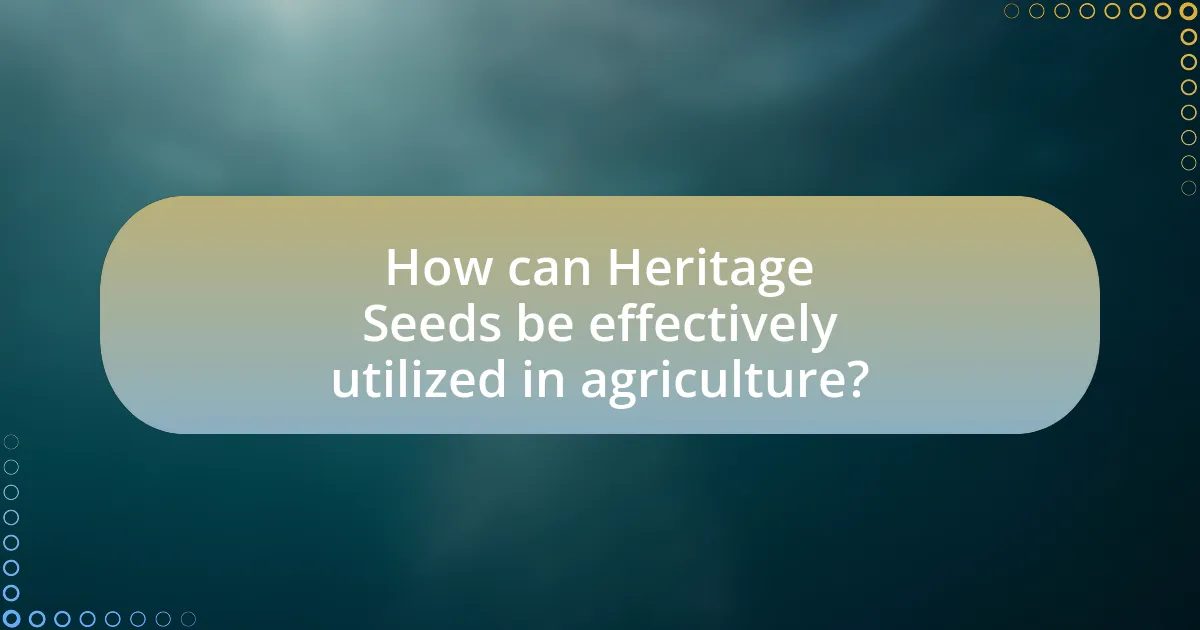
How can Heritage Seeds be effectively utilized in agriculture?
Heritage seeds can be effectively utilized in agriculture by promoting biodiversity, enhancing soil health, and supporting local ecosystems. These seeds, which are open-pollinated and often heirloom varieties, contribute to genetic diversity, making crops more resilient to pests and diseases. Research indicates that heritage seeds can improve soil structure and fertility due to their adaptability to local conditions, which is crucial for sustainable farming practices. For instance, a study published in the journal “Agriculture, Ecosystems & Environment” highlights that farms using diverse heritage seed varieties showed a 20% increase in yield stability compared to monoculture systems. This evidence supports the notion that heritage seeds are vital for sustainable agriculture and food security.
What are the best practices for growing Heritage Seeds?
The best practices for growing heritage seeds include selecting appropriate varieties, ensuring soil health, practicing crop rotation, and saving seeds for future planting. Selecting varieties that are well-suited to local climates and conditions enhances growth and yield. Maintaining soil health through organic matter addition and avoiding chemical fertilizers supports robust plant development. Crop rotation prevents soil depletion and reduces pest and disease pressure, which is crucial for heritage varieties that may be more susceptible to these issues. Additionally, saving seeds from the best plants allows for the preservation of genetic diversity and adaptation to local conditions, which is essential for sustainable agriculture. These practices are supported by research indicating that heritage seeds contribute to biodiversity and resilience in agricultural systems.
How can farmers select the right Heritage Seeds for their region?
Farmers can select the right Heritage Seeds for their region by assessing local climate conditions, soil types, and pest pressures. Understanding the specific environmental factors, such as temperature ranges and rainfall patterns, allows farmers to choose seeds that are well-adapted to their growing conditions. Additionally, conducting soil tests can help identify nutrient levels and pH, guiding the selection of seeds that thrive in those specific soil types. Research indicates that heritage varieties often possess traits that enhance resilience to local pests and diseases, making them a suitable choice for sustainable agriculture. For example, a study by the University of California found that heritage seeds can yield better results in specific regions due to their adaptation to local conditions, thus supporting food security.
What cultivation techniques enhance the yield of Heritage Seeds?
Crop rotation enhances the yield of Heritage Seeds by improving soil health and reducing pest pressure. This technique involves alternating different crops in the same area across seasons, which helps maintain nutrient balance and disrupts pest and disease cycles. Additionally, intercropping, where two or more crops are grown together, can maximize space and resource use, leading to higher overall yields. Research indicates that these practices can increase yields by up to 20% compared to monoculture systems, as demonstrated in studies conducted by the Food and Agriculture Organization.
What challenges do farmers face when using Heritage Seeds?
Farmers face several challenges when using Heritage Seeds, primarily related to lower yields and susceptibility to pests and diseases. Heritage Seeds often produce less than hybrid varieties, which can lead to reduced profitability for farmers. Additionally, these seeds may lack the genetic diversity found in modern hybrids, making crops more vulnerable to specific pests and diseases, as evidenced by studies showing increased crop losses in heritage varieties under pest pressure. Furthermore, farmers may encounter difficulties in sourcing these seeds, as they are not always readily available in commercial markets, limiting their options for planting.
How can farmers overcome the limitations of Heritage Seeds?
Farmers can overcome the limitations of Heritage Seeds by implementing crop rotation and intercropping strategies. These practices enhance soil health and biodiversity, which can mitigate the challenges posed by pests and diseases that often affect Heritage Seeds. Research indicates that crop rotation can reduce pest populations by disrupting their life cycles, while intercropping can improve resilience against environmental stressors. Additionally, farmers can engage in seed saving and sharing within their communities to maintain genetic diversity and adapt to local conditions, further strengthening the viability of Heritage Seeds in sustainable agriculture.
What support systems are available for farmers using Heritage Seeds?
Farmers using Heritage Seeds have access to various support systems, including agricultural extension services, seed banks, and community-based organizations. Agricultural extension services provide technical assistance and education on best practices for planting and maintaining Heritage Seeds, which enhances crop yield and sustainability. Seed banks offer preservation and distribution of Heritage Seeds, ensuring farmers can access diverse seed varieties that are adapted to local conditions. Community-based organizations often facilitate knowledge sharing and networking among farmers, promoting collaboration and resource sharing, which is essential for successful cultivation of Heritage Seeds. These support systems collectively contribute to the resilience and productivity of farmers engaged in sustainable agriculture.
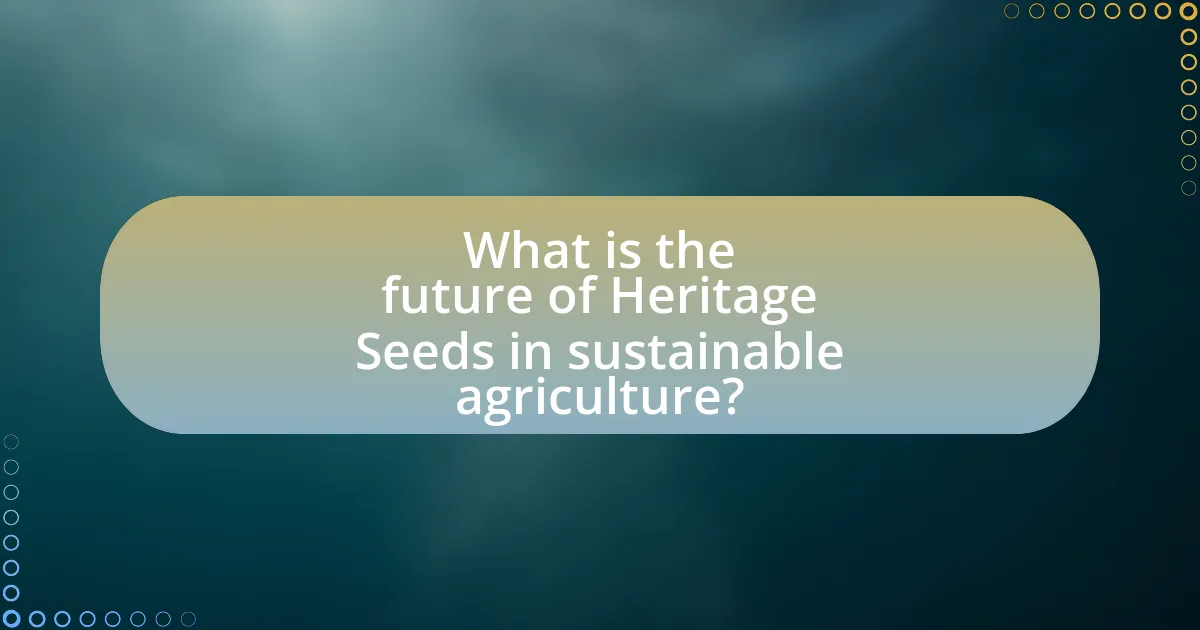
What is the future of Heritage Seeds in sustainable agriculture?
The future of Heritage Seeds in sustainable agriculture is promising, as they play a crucial role in preserving biodiversity and enhancing food security. Heritage Seeds, which are open-pollinated and non-hybrid varieties, contribute to sustainable practices by allowing farmers to save seeds, thus reducing dependency on commercial seed companies. Research indicates that these seeds can adapt better to local conditions, leading to increased resilience against climate change and pests. For instance, a study published in the journal “Agriculture, Ecosystems & Environment” highlights that the use of Heritage Seeds can improve soil health and promote agroecological practices, which are essential for sustainable farming systems.
How can policy changes support the use of Heritage Seeds?
Policy changes can support the use of Heritage Seeds by implementing regulations that protect their cultivation and promote biodiversity. For instance, governments can establish legal frameworks that recognize and safeguard the intellectual property rights of farmers who grow Heritage Seeds, ensuring they are not penalized for using traditional varieties. Additionally, financial incentives such as subsidies or grants can be introduced to encourage farmers to adopt Heritage Seeds, which can enhance local food systems and resilience against climate change. Evidence from the Food and Agriculture Organization indicates that promoting agrobiodiversity through policy can lead to improved food security and sustainable agricultural practices.
What initiatives are promoting Heritage Seeds in agriculture?
Initiatives promoting Heritage Seeds in agriculture include community seed banks, educational programs, and government policies aimed at preserving biodiversity. Community seed banks, such as the Seed Savers Exchange, facilitate the sharing and preservation of local seed varieties, ensuring genetic diversity. Educational programs, like those offered by the Agroecology and Sustainable Food Systems program, teach farmers about the benefits of using Heritage Seeds for sustainable practices. Additionally, government policies in countries like India support the conservation of traditional seeds through initiatives like the National Biodiversity Action Plan, which emphasizes the importance of indigenous varieties for food security and resilience against climate change.
How can consumers advocate for Heritage Seeds?
Consumers can advocate for Heritage Seeds by supporting local farmers who grow these varieties, participating in seed exchanges, and educating others about the benefits of biodiversity in agriculture. By purchasing Heritage Seeds from farmers’ markets or specialty stores, consumers directly contribute to the preservation of these seeds. Additionally, engaging in community discussions and workshops can raise awareness about the importance of Heritage Seeds in maintaining food security and sustainable agriculture. Research indicates that Heritage Seeds contribute to genetic diversity, which is crucial for resilience against pests and climate change, thus reinforcing their significance in sustainable farming practices.
What practical steps can individuals take to support Heritage Seeds?
Individuals can support Heritage Seeds by purchasing and planting them in their gardens. By choosing Heritage Seeds, individuals contribute to the preservation of biodiversity and the continuation of traditional agricultural practices. Supporting local seed banks and participating in seed-saving initiatives also helps maintain these varieties. According to the Seed Savers Exchange, Heritage Seeds are crucial for food security as they adapt to local conditions and promote resilience in agriculture. Engaging in community gardening projects that focus on Heritage Seeds further enhances local food systems and fosters sustainable practices.
How can home gardeners incorporate Heritage Seeds into their practices?
Home gardeners can incorporate Heritage Seeds into their practices by selecting and planting these seeds to promote biodiversity and preserve traditional varieties. Heritage Seeds, which are open-pollinated and often heirloom varieties, allow gardeners to cultivate plants that are well-adapted to local conditions and have unique flavors and characteristics. By using Heritage Seeds, gardeners contribute to food security and sustainable agriculture, as these seeds can be saved and replanted year after year, reducing dependency on commercial seed sources. Additionally, studies have shown that growing diverse crops from Heritage Seeds can enhance soil health and resilience against pests and diseases, further supporting sustainable gardening practices.
What resources are available for learning about Heritage Seeds?
Resources available for learning about Heritage Seeds include books, online courses, and agricultural extension programs. Notable books such as “Seed to Seed” by Suzanne Ashworth provide comprehensive information on seed saving and heritage varieties. Online platforms like Coursera and Udemy offer courses focused on sustainable agriculture and seed preservation. Additionally, local agricultural extension services often provide workshops and materials on heritage seeds, emphasizing their importance in biodiversity and food security. These resources collectively support the understanding and cultivation of heritage seeds, which are vital for sustainable agriculture practices.
